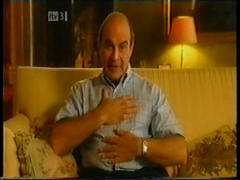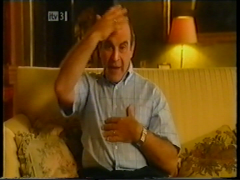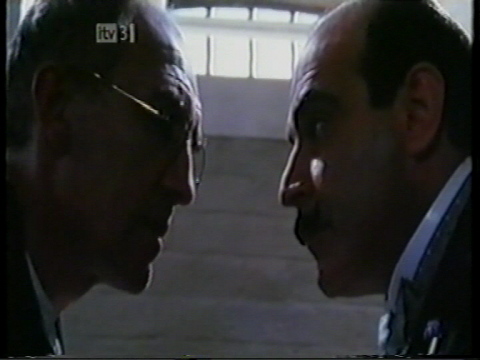Part 1
How it all began...
Suchet: Because I had been lots of different characters, this was going to be another character... I started to go back to the books, and I met a little man that Iíve never met before in any of the films. What I didnít know was, that I was the choice of the Agatha Christie estate, the family. Rosalind Hicks, the daughter of Agatha Christie, and her husband, Anthony Hicks, wanted to meet me and have lunch, and they said how pleased they were that I was going to do Hercule Poirot, and all of a sudden the conversation became incredibly serious... In fact Anthony Hicks looked at me, and his finger, like this [Suchet pointing] - and he said: "We do not want anybody to laugh at Poirot... They can laugh with Poirot, they can smile with Poirot because of his eccentricities, but he is not a clown, and I want you to take him very seriously... "
Suchet showing Anthony Hicks' pointing finger during their lunch-meeting
I had learned how to do bow ties, when I was Ďout of workí actor. I used to get tips from Americans. Yeah [nodding], they used to tip me, if I could tie their bow tie and teach them how to. Little did I know [laughing] that this was all wonderful training [laughing even more] for a career... [becomes serious again] - but there you are, and I would do my own bow tie, and... and the bow tie had to be perfect... In fact somebody said to me: ďBut itís so perfect that it could be a made-up oneĒ... - and I knew then [putting his head on one side, pointing a finger and screw up one eye] I got it right... Because for Poirot it had to be that perfect [smiling].
- and I knew then I got it right...
The first day - oh, gosh, I remember it, because it was... I think it was... Edward Bennett and myself discussed the fir... how would we introduce Poirot!
And together we knew, we should start with the shoes... And there was a camera movement, when you saw the spats, up my leg, and you saw the crease in my trousers, and then it came up, and I think, if I remember correctly, you could see the fob-watch and the waistcoat, ant then it would come up, come up... What I do remember vividly with the production values... and I remember leaving my dressing room one day, and we saw this big crane-[?] [near? on?] the Albert Bridge, and I looked at Hugh, and Hugh looked at me, and ac... actually I think it was Hugh that said to me... [in a low voice] My God, they are spending money on this... and I looked and thought... [even lower voice]... He's right...
And I remember another moment in that first episode. I was in a taxi, and I think at one point Poirot looks out at the window, and I saw nannies with prams, people on 1930s bikes, we saw cars, way into the distance children playing, all in 30s costumes, and thatís when I thought to myself, wow, Iím in something so special... [slowly nodding his head].
I had to do a mixture - of French and Belgian, but I also need to speak English - so I listen to English speaking Belgian radio, English speaking French radio.  Now once Iíve done that - I couldnít use my own voice - well, listen to my voice, itís down here [placing one hand flat at his chest while holding the other flat on his stomach], but Poirot is a head voice [placing the hand from his chest up on his forehead] - so what I had to do was, start with my voice down here [placing his hands down in front of his stomach] think [switching to a Charles Boyer/Aznavour alike accent] a lit(t)le bit about Freennch accaang, or som(e)thinng like thaat, ta(l)kinng, and then you have the [switch to an accent with the harsch Flemish glottal stop] glottal sounds of the Flemish here coming!!! And then you mix the Flemish with the French and the sound, something like thiis, and a little like thaat, but you raise your voice slightly [voice becomes lighter], and it goes to the chest [one hand flat slightly and repeatedly beating his chest while moving upwards, keeping the accent] and then it goes to the throat, and then you put in a little Belgian, a little French, up, up, up... [hands going higher and voice going lighter and Poirotís voice takes over] and there you are, you have (H)ercule Poirot!... [Suchet pauses and smiles broadly. Somebody in the background applauses and laughs].
Now once Iíve done that - I couldnít use my own voice - well, listen to my voice, itís down here [placing one hand flat at his chest while holding the other flat on his stomach], but Poirot is a head voice [placing the hand from his chest up on his forehead] - so what I had to do was, start with my voice down here [placing his hands down in front of his stomach] think [switching to a Charles Boyer/Aznavour alike accent] a lit(t)le bit about Freennch accaang, or som(e)thinng like thaat, ta(l)kinng, and then you have the [switch to an accent with the harsch Flemish glottal stop] glottal sounds of the Flemish here coming!!! And then you mix the Flemish with the French and the sound, something like thiis, and a little like thaat, but you raise your voice slightly [voice becomes lighter], and it goes to the chest [one hand flat slightly and repeatedly beating his chest while moving upwards, keeping the accent] and then it goes to the throat, and then you put in a little Belgian, a little French, up, up, up... [hands going higher and voice going lighter and Poirotís voice takes over] and there you are, you have (H)ercule Poirot!... [Suchet pauses and smiles broadly. Somebody in the background applauses and laughs].

Poirot is a head voice...
A little bonus...
ďDo they think, they can get rid of Hercule Poirot like that! No!......... No, no... no, no, no... no! Thirty-six times, NO!"
Poirotís reaction when the Tods dismiss him from the case of the disappeared Eliza Dunn in the episode The Adventure of the Clapham Cook, the first episode Suchet appeared in as Poirot.
Part 2
My most intriguing mysteryÖ
Suchet: I think Agatha Christie... er... is one of the great mystery and intrigue writers. Not so much for her plots.... I think sheís great because of her characterizations. I think thatís where she really scores. She has great heroines, great detectives, great villains, she has great knowledge herself of drugs, because she herself was a dispensing chemist in the First WW... I think Agatha Christie has a sense of mystery all around herself, as well...
and in a sense for me one of the great mixtures that Agatha Christie puts in with character and plot... er... intrigue, mystery and very clever... for me? The ABC Murders! Itís as simple as the murderer decides to kill according to the alphabet. And where do you go with that...
Itís with an actor, a wonderful actor called Donald Sumpter, to playing Cust, and he is suspected of being the murderer, and he is put into jail, and I visit him in jail - and I think as far as actors are concerned, here in terms of craft, less is more...
I remember, there is only two of us in the scene... and a lot of it was, er, profile, and just very quietly, two fully rounded characters, confronting one another... in a very small area of the jail cell... er... and looking back over all the years that Iíve done Poirot, that scene with Donald has to be... one of my very favourites.
Scenes come together in very many different ways. Sometimes the director has a very firm concept of how he wants it shot, er, but the best scenes - er, er - come together when itís a collaboration. Er - Iíll have done my homework, the other actors have done their homework, the directors have done their homework, and there is so little time to rehearse, so you rush together before th... before you do the scene, er, you block it through, [in] another words you block... er... you, you hit certain marks that the director would like to hit and in so doing, youíre talking about the scene. And you say: "Well, maybe, because this is here, like this, maybe if I move over there, and there and there and there", and then he says: "Oh yes, well yes! Yes, because if you could do that, I could do a profile... on you there, and then maybe you could come very close together so that nose almost touches the nose, and yes! That would help that line, because that would make that very, very tense, and"... - so, the best of scenes is when everybody is working together!

- so that nose almost touches the nose...
Donald Sumpter and David Suchet in The ABC Murders
When acting these mysteries and these stories, you know, and I come back to this again and again and again - itís vital to take it seriously! There is much at stake! Er, and - if the writing is good, and the production values are good, and the music is good, and the story is good, and the characters above all, Š lŠ Christie, a[re] true, real, some are dark, some are light, they ar.. er... they all have colours, youíre gonna get a great, great mystery...
End of Part 2
Part 3
My most humorous episode...
Suchet: Thereís a lot of humour in them, I hope there is, anyway - but I hope it's subtle humour, in the same way as the books have a lot of humour. Er - the short stories actually contain, I think, perhaps [even?] more humour than the big long stories, where she gets really involved in the plot. But all the humour is of eccentricity. My humour for example, the humour of Poirot, is always of eccentricity or situation, where he finds himself with the sort of people that he - er - finds himself - talking to, that sort of thing...
- I'm not a bloody, little frog! I'm a bloody, little Belgian! - The Mystery of the Spanish Chest
Whenever I do those comedy moments, I remember, donít let them laugh at... make them laugh or smile with... and thatís of his eccentricity. You must never hopefully see me, the actor, telling you Iím being funny...
One particularly episode I remember, is called The Veiled Lady - [?] with a wonderful performance with Frances Barber [for one ?] - but Poirot has to get into disguise because he - he actually takes on the role of a burglar - I wonít spoil the plot or anything like that, but he does, and he gets in disguise. And, ah - the amount of discussion, how... what will he wear, what will he not wear, what will he wea.. it had to be real. Well of course seeing Poirot in disguise is funny, anyway. But it mustnít be a costume that commented on that. Poirotís moustache actually drooped. I think itís the only time you ever see it - down, er - and once again, must not be commented on. But Iíve got so many letters saying that people loved that episode, because they laughed and they laughed and they laughed - and of course, the great thing about it was, I didnít know I was being funny...
- I am the locksmith! - The Veiled Lady
I think itís very important to bring out the humour in the right way, because they are not Who-dunnits - they are How-dunnits! How Poirot solves the murder! You all know, you have all seen the murder, there is no mystery about the murder. In the end itís how did he found out who, because nobody else can... Itís not just any detective. Itís this quirky little Belgian with the funny moustaches and the - and the egg-shaped head - itís the man, who canít eat two boiled eggs given to him if they are not exactly the same size. WhoseÖ the speck of dust on his shoulder is as painful to him as a bullet wound! He once wore a watch in stead of a - a fob, around his waist [Suchet switches four times between looking at his watch on his left hand and an imaginary fob in his right hand, while saying] and he couldn't, he couldnít, he - he couldnít, he couldnít make it work... Itís these characteristics, itís his hot chocolate night, his - his muffle around his neck, his sneezing, his colds, his hypochondria... itís all this, that are both amusing, delighting the audience, delighting the reader, who can smile and laugh, and then be drawn right in, when he uses his famous [switch to Poirot accent] little grey cells!
Oh, it looks so easy now, doesnít it? [saying, while laughing] I ca... it was... it was hours and days and weeks and weeks and weeks and... Itís alright having a dossier like that about a character, but in a - in a sense itís terrible [laughing] having a dossier like that about the character, because every page is filled with... with character... characteristics! And I didnít want just to get a paintbrush and just paint on that little man, I didnít! - I wanted to become his shape, so before we started shooting, I would - I would drive them crazy with costume fittings, padding fittings... Er - you know, I was developing his eye. I would say: "No, that side of the jacket is a millimetre longer than the other side of the jacket", and they would look at me and go: "What!".... And I would say: "No, it is, itís not right, itís not right, itís gotta be perfect, itís gotta be this than the other..." er - it had to be right...
The size of a Poirot-dossier...
End of Part 3
November 2007 © All rights reserved
